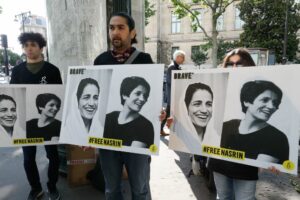From the Frontlines in Iran: Our Fight for Human Rights and Gender Equality
Originally published by Nasrin Sotoudeh for Ms. Magazine
Nasrin Sotoudeh is an Iranian human rights lawyer who has spent her career fighting for the rights of women and minorities in the Middle East. Arrested in June 2018 because of her work representing opposition activists, religious minorities and women who publicly protested Iran’s mandatory hijab law, Sotoudeh was sentenced to 38 years in prison and 148 lashes, on charges that included “inciting corruption and prostitution,” “disrupting public order,” “propaganda against the state” and “collusion against national security.” She had previously been imprisoned from 2010 to 2013 on similar charges—a heavy price to pay for loving one’s country.
For her important work, Sotoudeh—a long-time friend of Ms. magazine—has been honored with copious awards and designations, including the U.S. State Department’s Global Human Rights Defender title and Ms. magazine’s Top Feminist award. Just this month, she is the sole recipient of both The Civil Courage Prize, which honors individuals who show courage against evil and oppression, and the Brown Democracy Medal from the McCourtney Institute for Democracy, marking the award’s 10th year.
The excerpt below is reprinted from Sotoudeh’s forthcoming book, Women, Life, Freedom: Our Fight for Human Rights and Equality in Iran, by Nasrin Sotoudeh (translated by Parisa Saranj, foreword by Jeff Kaufman). A free download of the book is available here.

When I was 21 years old, I took an undergraduate law class in Islamic jurisprudence. The professor was a cleric who also taught at the university before the revolution and occasionally expressed opposition to the Islamic government.
I asked him, “Why does the law consider blood money (diyah) for a woman to be half of that for a man?”
This was one of the provisions in Iran’s post-revolution constitution. It meant that if a man unintentionally killed a man, he would have to pay blood money to the victim’s family—but if he unintentionally killed a woman, only half of that amount would be awarded to hers. This was obviously demeaning to women. A cleric would have the answer, I thought.
He responded with a kind of evasion, saying, “I don’t know why. Ask those who have enacted these laws.”
This was 40 years ago. While my young mind was not yet fluent with concepts like activism, civil discourse, and human rights, I was unsatisfied with my professor’s answer. Having witnessed changes in attitudes towards women since adolescence, I felt a tangled anger that I couldn’t clearly express.
